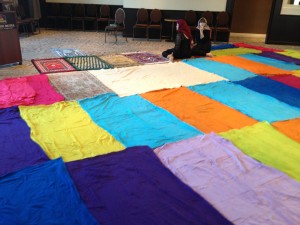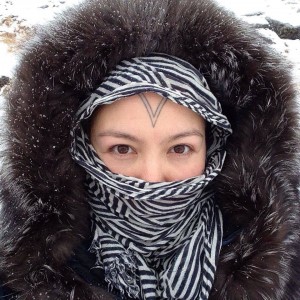As you know, last Friday was Eid-ul-Adha, a major holiday for Muslims around the world. Having enjoyed sharing our Ramadan experiences with our readers earlier this year, the MMW team wanted to briefly share some experiences and reflections on this Eid, focusing especially on the role of gender in how Eid is experienced in our respective communities. In this second segment, Eren, wood turtle, Krista and Azra reflect on Eid prayers and holiday traditions in North America. (Update: You can read part 1 here.)
Eren (Canada)
In the past few months I have grown away from my community in Western Canada. As a convert, and especially as a woman, I have found very challenging to grow spiritually in a community that endorses “tolerance” for women rather than inclusion.
This year, as Eid Al-Adha approached, I had to ponder whether or not to attend prayers and celebrations as I would be treated as an “unwanted guest.” While Eid celebrations are some of the few events were women are really encouraged to attend, spaces and accommodation does not always make it easier for women to partake in the ritual.
Attending communal events often means small and less maintained spaces for women to pray, strong emphasis on women’s outfits, and complete gender segregation, including families. Sometimes it just seems that bringing women into the picture is a hassle.
Some women in my community have had their share of disappointments while trying to claim a space in the mosque, but this is not only a challenge when it comes to the mosque’s leadership. While I do not know the opinions of the men in my community, as we never share the same space, some women strive to maintain the mosque a highly patriarchal environment with little space for women.
In an attempt to preserve what they consider to be “real Islam,” some women endorse the restriction of their own rights and spaces in favour of men in the community. Surprisingly, an increasing number of young women participate in this. Thus, they advocate for segregated prayer spaces, strict dress codes, and exclusion of other groups such as LGBTQ Muslims and non-practicing Muslims. Similarly, it is sometimes these same women the ones that advise other women not to attend prayers and events with small children as they “disrupt” the men and older women in the congregation.
All this combined tends to make some women, including me, feel like strangers in a sacred place that supposes to feel like home. It discourages us from practicing and taking part in community activities. At the same time, it discourages understanding between men and women in the community by defining us as two distinct groups that are in opposition to each other. And when I think about all this, I just wonder, are we really such a hassle that they need to make the huge effort of “tolerating” us?
wood turtle (Canada)
Now that my daughter is old enough to enjoy and recognize celebrations, I’ve decided to make Eid all about her. So, knowing that I’d probably pray outside the main prayer hall away from my Hubby, behind a projected image of the imam, and hear a generic ‘Eid sermon on Abraham’s sacrifice – this ‘Eid I just went through the motions, putting aside any desire or hope for an inclusive mosque experience, while making sure my daughter had a day filled with balloons, bouncy castles and halal marshmallow cupcakes.
It came as no surprise that, as a repetition-loving three year old, she would become obsessed with the ‘Eid takbeer. We chanted while rushing to get dressed. We chanted while racing to the masjid. We chanted while trying to find parking in a sea of badly double-parked cars. We chanted while searching for a prayer space. We only stopped chanting when the prayer organizers led the takbeer two octaves too low for us to harmonize comfortably.
Seriously, I don’t know why the takbeerat can’t be led in a way that doesn’t force women into either a high-pitched screech or a deep “smoker’s voice.” Or *gasp* why the takbeerat couldn’t be led by a group of women instead!
As predicted, the small women’s section in the main prayer area was full by the time we arrived, so I split from the Hubby and took my two girls to pray in an alternate area set up in the gym. Both men and women had their “traditional” sections, and we all followed the imam from a projected image of the real action happening in the main prayer area.
There was nothing particularly spectacular about the sermon itself — being a straightforward Hajj reflection on sacrifice and the great Patriarch. Every year I complain that not enough is done to recognize the importance of Hagar — and every year I am sorely disappointed. I would love to hear a sermon focusing on her, noting that without her sacrifice, faith, ingenuity and leadership, Mecca might not even exist. This year the imam didn’t even mention Hagar by name — she was just “Ibrahim’s wife.”
For so many years my ‘Eid experience has been marked by the main event of praying at the mosque. But it’s been too long since I’ve felt included – from the full erasure of my gender by the physical presence of barriers and anti-women spaces, to ideological gaps that prevent traditional knowledge transmission of truly fabulous Muslim women. So in the end, it didn’t faze me to leave the sermon early, something I wouldn’t have dared years ago. I just couldn’t be bothered staying in a place that didn’t have my family in mind when organizing our community’s largest religious celebration.
Because really, all I wanted to do on ‘Eid was to see my daughter scream in delight on a bouncy castle (which is problematic in that she may not be associating any happy memories with the mosque). It’s quite sad really, seeing the importance of the ‘Eid prayer, and quite telling of the disempowerment felt by myself and others who are regularly excluded from the mosque.
Krista (Canada)
I had a unique and wonderful Eid-ul-Adha this year. For the first time, the el-Tawhid Juma Circle hosted its own Eid prayer gathering, and I made the trek to Toronto to join them. The group works from a gender-equal and queer-positive framework, and emphasises openness and acceptance, along with rotating and shared religious authority, regardless of gender (or anything else). It is a group of incredibly sincere and dedicated people who are devoted to creating the kind of community that they want to have, and one of the rare spaces where I haven’t felt like it’s a problem to be too “progressive” or too “traditional.”

The Eid prayer was hosted in a rented meeting room at a hotel, and the actual prayer space was made up of a few prayer rugs and many pieces of brightly coloured fabrics. The colourful space, quirky and eclectic as it was, made me smile every time I looked around, and the multiethnic and multigenerational congregation was equally colourful and eclectic. The khutba was given by Dr. Timothy Gianotti, who talked about Prophet Ibrahim’s (peace be upon him) commitment to standing up for truth and challenging the ideas that we follow simply because they represent the ways that things have always been. It was a provocative and inspiring message.
The actual salat (ritual prayer) was led by a woman, which is obviously significant and unusual; Dr. Nevin Reda’s recitation was beautiful, and I was proud to pray behind her. But what had a bigger impact on me personally was the fact that the congregation as a whole was not segregated – and, more to the point, that I didn’t have to accept an inferior prayer experience simply because I’m a woman. I know that there are some segregated prayer spaces that manage to make women feel welcome, but so many of my Eid prayers over the past few years have involved terrible sound systems where the khutba can’t be heard from the women’s section and/or cramped and dirty women’s sections. Last Friday, I was able to choose where I prayed within the space; I was able to hear and see the imam and the khateeb clearly, and to feel fully part of the congregation. There was something profoundly moving and healing about not having to settle for less.
Azra (United States)
Eid+Gender…There’s so much to think about. Especially when I think of Eid last week. During our last internal MMW video meeting, I was able to speak with our newest contributor, wood turtle, who talked about a post she wrote for her blog a few years back about reconsidering Eid al-Adha from Hagar’s eyes. As she puts forth, it certainly isn’t a theme that I remember hearing over the years at Eid prayers. Nor was it this year—this year’s khutbah included the following gem: “It’s shameful for women to come to the masjid wearing hijab and once they leave, take it off. They might as well not come at all.” Really?!? On Eid? Sigh.
I didn’t let the comment ruin the rest of my beautiful Eid weekend. Growing up as a kid, and even now as an adult, Eid celebrations feel especially well-suited to bring women from the community together. Henna parties the night before, time spent in the kitchen preparing sweets+sheer khurma the morning of, and wearing your new shalwar kameez, dress, slacks, or – God forbid! – sari in the evening.
There’s something that’s really lovely in these small moments of chitchatting among friends+family where men may indeed be present, but where there’s a really incredible energy among women. At least I have. Eid becomes a celebration of the choices women make in life–from the clothes we wear to the foods we share, the friends we have in our lives, and the religion we ultimately choose to follow of our own accord. All of our choices are beautiful and worthy of striving for.











